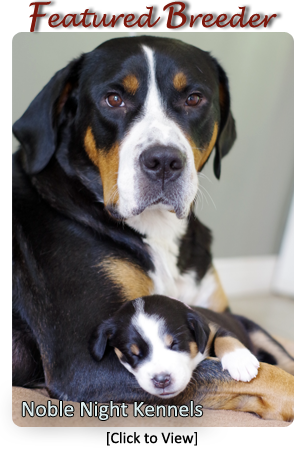
Greater Swiss Mountain Dog
Group: Working Group
Origin: Switzerland
Height:
– Males: From 25 ½ to 28 ½ inches (65-72 cm)
– Females: 23 ½ to 27 inches
Weight: Males: From 105 to 140 lbs – Females: From 85 to 110 lbs
CLICK HERE to View Breeder Listings
Breed Profile
The Greater Swiss Mountain Dog (Grosser Schweizer Sennenhund) is considered to be the oldest and is the largest of the four Swiss Mountain Dog breeds — The other three being the Bernese Mountain Dog, the Entlebucher and the Appenzeller. He is descended from Mastiffs that came to Switzerland with the Romans. Like the Bernese Mountain Dog, he was used to assist farmers and butchers by guarding and driving livestock and pulling carts. He was also used to track and as a search and rescue dog. Today, the Swissy is mostly a family companion and is noted for his gentle nature, loyalty and wonderful disposition.
He is easygoing, obedient, bold and faithful. He loves children and makes an excellent watch dog. The powerful dog is always alert, vigilant, energetic and eager to work.
His double, weather-resistant coat is short and thick, and the typical Swiss tri-colour — deep, lustrous black with white and tan trim on the feet, face, chest and tail.
Health Issues
The Greater Swiss Mountain Dog is known to be a healthy breed. However, like all breeds of dogs, certain health problems have been found in the breed, including Hip Dysplasia, Elbow Dysplasia, and some eye problems including entropy and ectropion.
In addition, as with many large breeds, Gastric Torsion or Bloat is a real possibility in the Greater Swiss Mountain Dog. If you are not familiar with this condition, it is absolutely necessary to learn about it and know the symptoms – This is a real emergency and a life threatening condition that requires immediate Veterinary attention. See Gastric Dilatation Volvulus (GDV) – Bloat in the Health and Nutrition section of Canada’s Guide to Dogs for more information and First Aid for Bloat for an article describing some of the things you can do if you are faced with this situation.
If you are considering the adoption of a Swissy puppy, or any breed, it is very important to be selective in choosing a responsible and reputable breeder. Ensure that the prospective puppy’s parents have all health clearances. Breeding of any dog should not be done until after they have been proven to be free of evidence of significant hereditary diseases. (For more information on selecting a breeder, see the articles on the main General Information page.)
Additional Health Resources:
- The GSMD Health — From the Greater Swiss Mountain Dog Club of America
- Canine Health Information Center (CHIC) — Providing a source of health information for owners, breeders, and scientists that will assist in breeding healthy dogs. CHIC is a centralized canine health database jointly sponsored by the AKC/Canine Health Foundation (AKC/CHF) and the Orthopedic Foundation for Animals (OFA).
- Health and Nutrition — Growing section of the Canada’s Guide to Dogs website which includes information on several health and nutrition related issues.
- AKC Canine Health Foundation — Working towards developing scientific advances in canine health.
- OFA – Companion Animal Eye Registry (CAER)
- Orthopedic Foundation for Animals (OFA)
- Ontario Veterinary College (OVC)
- University of Pennsylvania Hip Improvement Program (PennHip)
- HealthGene — HealthGene Corporation is the leading provider of veterinary DNA diagnostic services in Canada.
- Labgenvet — Laboratory of Veterinary Genetics is a Canadian diagnostic laboratory that offers a comprehensive service of DNA tests for veterinary genetic diseases.
Grooming Information
- Grooming — This section of the Canada’s Guide to Dogs website includes tips, articles and information covering all aspects of dog grooming along with a listing of Groomers from across Canada.
Training Resources
- Training — For training information, see this growing section of the Canada’s Guide to Dogs website for tips, articles, as well as listings of training centres across Canada.
Additional Information
- Clubs, Sports & Activities — For information on the many sports and activities you can get involved in with your dog.
- Working Dogs — The Working Dogs section of the Canada’s Guide to Dogs website provides information and listings of organizations that are involved in various dog jobs, such as Guide Dogs, Therapy Dogs, Police Dogs, Protection Dogs, and much more.
*NOTE 1: CHIC – The Canine Health Information Center “is a database of consolidated health screening results from multiple sources. Co-sponsored by the Orthopedic Foundation for Animals (OFA) and the American Kennel Club (AKC) Canine Health Foundation, CHIC works with parent clubs to identify health screening protocols appropriate for individual breeds. Dogs tested in accordance with the parent club established requirements, that have their results registered and made available in the public domain are issued CHIC numbers.” To learn more, visit: www.caninehealthinfo.org
*NOTE 2: The Fédération Cynologique International (FCI) is the World Canine Organization, which includes 91 members and contract partners (one member per country) that each issue their own pedigrees and train their own judges. The FCI recognizes 344 breeds, with each being the “property” of a specific country. The “owner” countries write the standards of these breeds in co-operation with the Standards and Scientific Commissions of the FCI, and the translation and updating are carried out by the FCI. The FCI is not a breed registry nor does it issue pedigrees.
Breed Listing
Quick Links
Get In Touch
- Email: canadasguidetodogs@gmail.com
- Email: info@canadasguidetodogs.com
- Visit us on Facebook: www.facebook.com/CanadasGuideToDogs
— CanadasGuideToDogs.com is an Amazon Associate as well as a participant in various affiliate programs, as such fees are earned from qualifying purchases.

